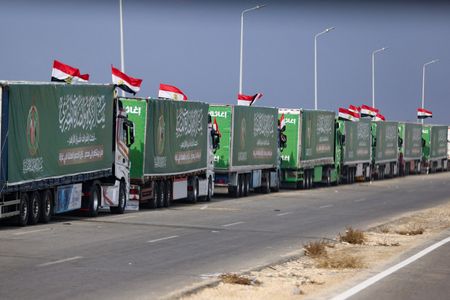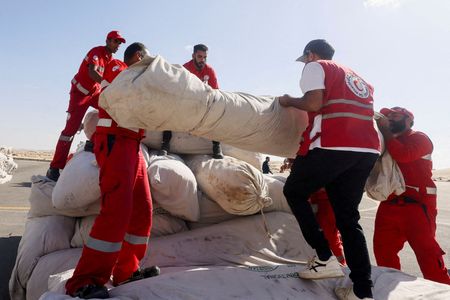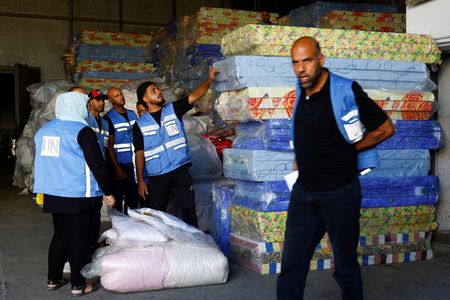By Emma Farge and Aidan Lewis
(Reuters) -Distribution of food and medical supplies is faltering in Gaza due to a chronic lack of fuel, looting of stores, the choking of streets with rubble from Israeli shelling and overcrowding caused by displacement of civilians.
And despite an uptick in the trickle of supplies, the number of aid trucks entering Gaza remains tiny - averaging 14 daily - compared to the 400 trucks seen daily in normal times for a population of 2.3 million now desperate for essentials like bread, aid officials say.
"The level of humanitarian assistance that has been allowed into Gaza up to this point is completely inadequate and not commensurate with the needs of people in Gaza, compounding the humanitarian tragedy," U.N. Secretary-General Antonio Guterres said on Tuesday, reiterating his call for a humanitarian truce.
U.N. Palestinian refugee agency (UNRWA) says a break-in by hungry Gazans on Sunday at one of its two warehouses has complicated its work. The second warehouse near the Rafah border crossing with Egypt has also become harder to operate because 8,000 displaced people are sheltering at it.
The agency has also seen 67 of its workers killed in Gaza since Oct. 7, the highest number of UN staff killed in any conflict in such a short span of time, it said.
UNRWA spokesperson Juliette Touma said the agency's priority was providing aid to at least 670,000 displaced people in 150 shelters, while another priority was providing wheat flour to bakeries.
"We're way beyond our capacity" to do anything more than that, she added.
The number of displaced is four times more than UNRWA had planned for before the war as a worst case scenario, she said.
The International Federation of Red Cross and Red Crescent Societies said their Gaza City warehouses had suffered "severe damage" on Monday and were out of service.
Israel is blockading Gaza and refuses to allow in fuel, saying it could be used by the Hamas militant group for their military goals.
"The constant threat of bombardment, debris, and lack of fuel makes roads extremely dangerous and inaccessible in many parts of the Gaza Strip," said Jonathan Crickx, communications chief for UNICEF Palestine.
While UNICEF is bringing in medical supplies, he said, "distribution is becoming more and more difficult".
Egyptian security sources and a Palestinian border official said there were plans to bring medical evacuees out of Gaza on Wednesday for treatment in Egypt.
U.S. Secretary of State Antony Blinken described the humanitarian situation in Gaza as "beyond urgent" and said Washington was working to increase aid deliveries to 100 trucks a day. "My hope is that will happen this week," Blinken told a hearing about U.S. funding to support Israel and Ukraine. The U.S. was "working on a mechanism that can get fuel to where it's needed" in Gaza, he said.
The White House said 66 trucks had entered Gaza in the past 24 hours, and that dozens more were expected to clear on Tuesday.
SANITATION 'ATROCIOUS'
Aid flows to Gaza have fallen sharply since Israel started shelling the Palestinian enclave in response to an attack by the Hamas militant group on Oct. 7 that killed 1,400 people.
The death toll from the bombardment has caused international uproar. Medical authorities in Hamas-run Gaza said on Tuesday that 8,525 people including 3,542 minors had been killed.
Distribution is particularly hard in northern Gaza, the main focus of Israel's military operation, aid officials say, and some have halted all deliveries.
World Health Organization (WHO) spokesperson Christian Lindmeier said on Tuesday it had sent no further aid to northern Gaza hospitals since Oct. 24, citing a lack of security guarantees.
A public health catastrophe is imminent, he said, amid the mass displacement and damage to water and sanitation infrastructure.
He said there had been 82 attacks on healthcare facilities in Gaza since the conflict began on Oct. 7, with 491 people killed in the attacks, including 16 on duty health workers, and 28 ambulances damaged or destroyed.
Rick Brennan, the WHO regional emergencies director, told Reuters that with 1.4 million people displaced in such a densely populated territory, conditions were dire.
"The sanitation is atrocious, I mean I was just talking to an UNRWA colleague, she said the living conditions are sub-human. Where do people go to the bathroom? How do you remove all waste?"
He said such a condition was ripe for the outbreak of diseases such as diarrhoea and respiratory and skin infections such as scabies.
In Cairo, U.S. Special Envoy David Satterfield, who has been negotiating with Israel and Egypt over aid deliveries, said providing humanitarian aid was critically important for Gaza, whose inhabitants say food and water have almost run out.
"This is a society on edge and desperate… and the U.N. implementers must be able to demonstrate that aid is not episodic," he said in a briefing for reporters.
Aid flows from Egypt have been slowed by an inspection system agreed with Israel in which trucks drive from the Rafah crossing along the Egypt-Israel border before returning towards Gaza. UNRWA's Touma called the system "way too cumbersome".
(Additional reporting by Gabrielle Tetrault-Farber, Michelle Nichols, Humeyra Pamuk, Simon Lewis and Nidal al-Mughrabi; Editing by William Maclean and Gareth Jones)










